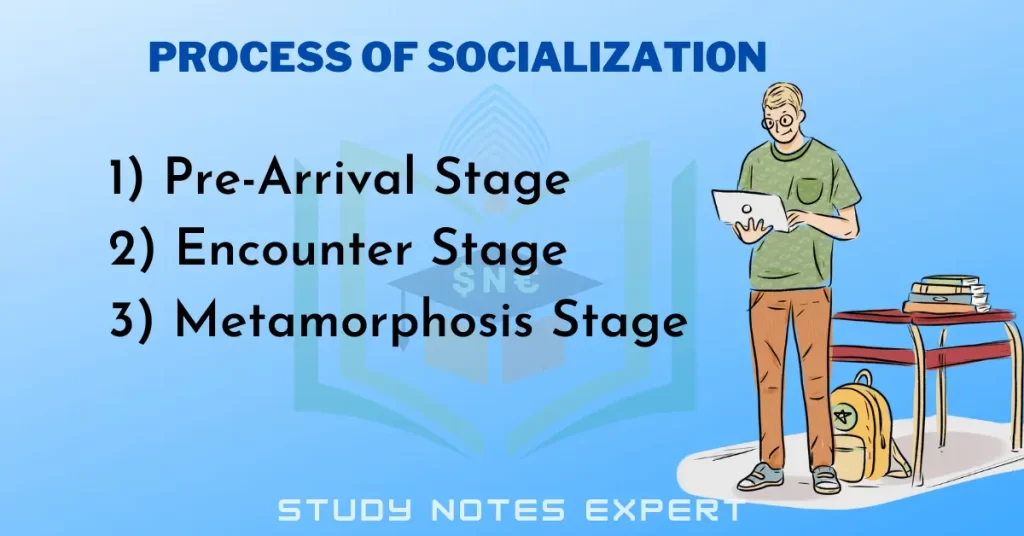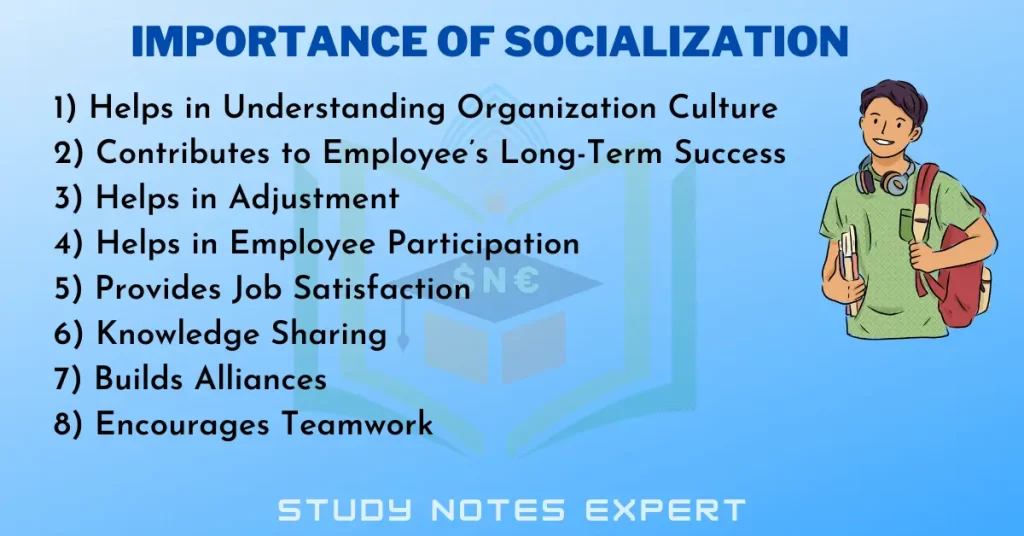People often need clarification with induction and socialization. However, induction is just an element of the entire socialization process. Socialization refers to a long-lasting process of scheduled and unscheduled, informal and formal activities by which an individual attains attitudes, behaviors, and knowledge of an organization and adapts to its culture. Organizational norms and values can be transmitted to employees in several ways, like through stories, material symbols, rituals, language, etc.
In the organization’s context, socialization is fundamentally a procedure of getting acquainted with the organization’s culture. For example, when a person starts a new job, is transferred laterally, or is promoted. He has to adjust to the new environment. A new environment includes diverse duties, a new employer, varied groups of co-workers, and a different set of criteria that need to be met to reach the top. This socialization continues throughout the career of an individual.
Definitions of Socialization
The most significant adjustment takes place when a person takes the first step in an organization and becomes a part of that organization.
Robert Kreitner states, “Organizational socialization is the process of transforming outsiders into accepted insiders.”
According to Jablin, “Socialization is the process by which organizational members become a part of, or absorbed into, the culture of an organization.”
According to Van Maanen and Schein, “Socialization is the process by which newly hired employees (newcomers) learn about, adapt to, and come to identify with the organization”.
Main 5 Contents of Socialization [Learning Approaches]
Content of socialization includes the following types of learning:
1) Preliminary Learning
Preliminary learning focuses on the importance of learning. It is associated with learning content, e.g., what will be learned and the person guiding it.
2) Organisational Learning
It is concerned with learning the objectives, values, and principles of the organization.
3) Learning to function in the Work Group
It comprises learning the values, customs, roles, and relationships within a group.
4) Learning How to Perform the Job
It involves learning the skills and abilities for performing the job efficiently.
5) Personal Learning
It involves gaining knowledge about the job and organization by self-experience.
Complete Process of Socialization [Step-by-Step Stages Guide]

The socialization process influences new members’ productivity, dedication to the organization’s objectives, and the decision to remain with the organization. It generally includes three stages.
1) Pre-Arrival Stage
This stage clearly states that everyone who has just joined the organization has their own values, attitudes, and expectations. When experienced people enter an organization, they bring the cultural values of the previous organization. When a fresher directly enters the organization from his college, he only has conceptual knowledge and little information about the organizational functioning taught in college.
During the selection process, organizations seek candidates who can easily adjust themselves to the organization. Hence, during the socialization process, candidates make all efforts to gain knowledge from various mediums about the organization to make themselves worthy of the organization. Freshers, as well as experienced people, must adapt to the culture, values, and work ethics of the new organization.
2) Encounter Stage
Once the candidate joins the organization, he enters the encounter stage. During this stage, the individuals tackle the reality, which may be opposite to what they have expected about their jobs, colleagues, employers, and the organization. If the expectation meets reality, then the encounter stage confirms the candidate’s perception.
There are chances of cultural shock in the opposite case, which needs to be handled. Thus, the person has to forget his previous values and beliefs before learning the new ones; otherwise, he may feel exhausted and leave the job.
3) Metamorphosis Stage
Candidates who have newly joined the organization must try to overcome the issues faced during the encounter stage. This means undergoing modifications. Therefore, it is known as the metamorphosis stage. This stage is finished when the candidates become familiar with the job and surroundings. They have understood the rules and regulations of the new organization. The new candidates begin to gain the trust of their employers; hence, they feel like part of the organization. Their employers assure them and, therefore, become confident to perform their duties efficiently. They understand the entire system, i.e., not only their duties and responsibilities but also the rules, regulations, and procedures followed in the organization.
4 Methods of Socialization [Organization Perspective]
The different methods which can be used to transfer the organizational norms and values to the employees are stated below:
1) Stories
Stories are the most popular method by which individuals work and communicate based on their experience. To learn the organizational values and norms with the help of stories, it will require the circulation of the oral and informal descriptions of events regarding the organization, different rules, its founders, and other practices followed in organizations. These stories create a valid point of view about the organization rather than the things written in the organizational documents.
2) Rituals
Rituals can be seen as the recurring sequences of actions that express and strengthen the crucial values of the organization, like identifying who are the influential individuals, which objectives are of utmost importance, or which ones are not essential. For example, in many organizations, the top performers are rewarded, which signifies the importance of high performance.
3) Material Symbols
Organizations use different material symbols to communicate particular meanings. For example, the additional facilities provided to an individual by the organization can reflect his status in the firm. Different sizes of rooms, tables, nameplates, etc., are used to exhibit these differences.
4) Language
To address and recognize the members of a culture or sub-culture, languages are used by many organizations. The acceptance of culture is confirmed when these languages are learned by the members, and thus, by accepting it, culture is also preserved. With time, organizations use different terminologies and vocabularies to represent various equipment, key employees, offices, customers, suppliers, etc. Once new members accept and adopt these terminologies, they serve as a common thread that binds the members of different cultures.
8 Importance of Socialization [For Organization & Employees Perspective]

The importance of socialization is as follows:
1) Helps in Understanding Organization Culture
Socialization makes employees feel comfortable. It makes the employee aware of the company’s values, procedures, and customs so that employees can understand them and adjust themselves in the organization.
2) Contributes to Employee’s Long-Term Success
Socialization is very helpful in an employee’s long-term success. Employees who correctly understand their roles and responsibilities are more contended, more engrossed with their career prospects, and more adjusting in nature. Hence, there are chances that such employees have a higher salary than those not correctly socialized.
3) Helps in Adjustment
Socialization helps the employee adapt to the new surroundings quickly, thereby minimizing the cultural shock that the fresher might suffer.
4) Helps in Employee Participation
Employee participation refers to the degree of involvement of employees with their job and their willingness to put in additional effort to attain the organizational goals. It is considered an essential element of competitive advantage in various organizations. Thus, participative employees are more socialized because they easily adjust to the new job, new group, and even the entire organization.
5) Provides Job Satisfaction
It gives job satisfaction to new employees because they can understand their duties and responsibilities and realize the basis for analyzing their performance.
6) Knowledge Sharing
Employees exchange information on recent projects during socialization. Socialization also allows employees to understand various modifications in projects and policies of a company. This helps leaders and employers of small businesses to coach and provide training to their employees.
7) Builds Alliances
Socialization helps develop new and strong associations within the company. An influential association between a member of the accounting department and a member of the production department could form a power team that can find a solution to reduce production costs.
8) Encourages Teamwork
Socialization also helps in building team spirit among employees. Small businesses focus on winning the trust of groups to attain significant outcomes. A simple greeting, a handshake, or socializing with employees helps boost the spirit of employee teamwork.
Key Questions Covered in this Article:
- What do we mean by socialization?
- What is the definition of socialization in organization?
- What is the best definition of socialization?
- What are the five content of socialization?
- What is the content and context of socialization?
- What are the 5 processes of socialization?
- What are the 4 stages of socialization?
- What are the 5 methods of socialization?
- What are your aims and methods of socialization?
- What is the most important for socialization?
- What are the 5 benefits of socialization?

